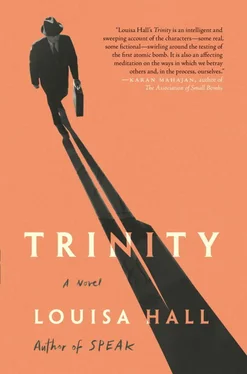Watching him deliver that line, it struck me that he probably wasn’t thinking that when the bomb really went off, or he wouldn’t have needed to send me home for the book, so that he could look the line up.
But that wasn’t the point. The point was that for Robert, there was no language short of myth to describe his bad situation.
That was something I understood.
By then, I realized, he felt he could summon no words of his own to explain what he was thinking and how he was feeling.
All he could do by way of language was send me running back through the plantations to pick up his Bhagavad Gita.
So you see, we were both in the same bind. We were both living in myth. We were fighting archetypical battles. We’d taken up roles that had been handed down to us from above: good and bad, sinner and saint. Both of us had blood on our hands. We went around Princeton carrying tablets. We were delivering speeches we hauled down from the top of the mountain, trying to redeem the damage we’d caused, heading for the underworld, looking for 129,000 lost people, or a single lost girl, hoping either to bring her back up or to stay down there in the underworld with her.
BY THEN IT WAS AUTUMN, I WAS DOWN TO EIGHTY-NINE POUNDS,and my pity for Robert was growing.
At night, lying awake, I thought about his suffering. I searched my brain for ways I could relieve it.
At some point in the fall, I began bringing him presents.
One day, for instance, I brought him one of Stan’s records. It was a recording of The Goldberg Variations, because I knew Robert liked Bach. Another day, I brought him a book of Renaissance sonnets that I’d read at Rosemont.
When he took it, he let it open at random, and when he looked down at the page, it seemed for a moment as if he might start crying.
Then he looked up, and he saw me.
From then on, I think, he really saw me. I’d called him Dr. Oppenheimer up to that point, but then he asked me if I’d call him Robert, and from then on, I felt as if he really saw me.
Moving around campus, as that fall became winter, we were two figures in a Renaissance painting. Everyone else was driving their cars and eating their hamburgers, listening to Patti Page and Perry Como, and Robert and I wandered around in our robes and our oils, surrounded by serpents and sylphs, and pomegranates and chariots and dogs with multiple heads, all of them roiling blackly around us, invisible to everyone else we passed on that campus.
By then, McCarthy had come to the peak of his power. Washington was caught in the worst grips of the Red Scare. That fall and that winter, hundreds of civil servants were fired on the flimsiest possible pretexts. Everyone, even the president, cowered in fear. And even so, McCarthy still delivered that speech charging Eisenhower’s administration with appeasing the liberals. And Eisenhower was so scared of losing the votes of McCarthy’s allies in the Senate that he didn’t respond, so really it was McCarthy he was appeasing, and Robert’s file—as he well knew—was worse than those of most of the bureaucrats who’d been fired or even imprisoned.
By then, he was really alone. His Washington friends wouldn’t touch him, and his Berkeley friends had long since turned against him. They started turning when his testimony against Bernard Peters was leaked to the papers. Then they’d turned even further when he didn’t stand up in Joe Weinberg’s defense, or plead the Fifth, as David Bohm did, which was why Bohm was blacklisted and imprisoned.
But Robert chose to testify. He admitted that Weinberg had been close with several members of the CP.
And then, of course, in addition, he’d advocated the deployment of those tactical nuclear weapons at the borders of Communist states, so whichever friends he had left from Berkeley had all turned against him. He was alone that winter in Princeton, except for Kitty, maybe, and me, and maybe that’s why he started to see me.
THAT WINTER, WE WERE NEVER INSIDE. WE SPENT MOST OF THE DAYwalking around campus. He smoked cigarette after cigarette, and sometimes he asked me for my opinions.
When I gave them, he’d reflect upon them quietly, then answer in a serious voice.
By then, he’d grown somewhat gaunt. His porkpie hat was becoming comedic, like a hat on a dancing skeleton.
I, too, had grown thinner. That winter my hair had begun to fall out.
So we were together, at least in that sense. We were sliding down the same hill, our cheekbones leaping out of our skin, our eyes lit up by invisible fires, licking the rims of invisible ruins.
In December, just before Christmas, I walked with him to the station.
He and Kitty were heading down to Washington to meet with their lawyer. When we arrived, Kitty was waiting. She was wearing a cream-colored wool coat, black pumps, and a black dress with a cinched belt. Her hair was freshly coiffed, and on her face, while she watched us approach, there was an expression of fury.
Then I remembered that mallard, and I was sure that she’d killed it.
I knew in my heart that she’d snapped its neck with her bare hands and left it to die at the end of the driveway.
WHEN THE TRAIN PULLED IN, ROBERT HELPED HER UP THE STEPS. ATthe top, she turned one last time to give me a furious look. I wondered, for the first time, if she thought there was something between me and her husband.
And there was something between us. But it was never romantic. Or it was romantic, in the sense of an old story about pages and knights, warriors battling against the dark forces.
But there was nothing sexual.
By then there was nothing sexual about me at all. Maybe there had been, back in those days when I ate sodden cereal and wrote novels at night and watched the leaves changing on the side of the highway.
But by the fall of 1953, those days were over.
I was eighty-eight pounds and my forearms were knotted with veins. My limbs were like a very large insect’s, and sex wasn’t an issue. It was too painful. My body simply couldn’t accept it.
IT WAS ON THAT TRIP TO WASHINGTON THAT STRAUSS MET WITHRobert and informed him that a new review of his background and policy recommendations had resulted in his security clearance getting temporarily revoked.
Strauss delivered a letter that had been prepared by the AEC. It detailed the charges against Robert.
I can’t remember how many there were, but the list went on for pages. There were political accusations, and personal accusations as well: everything from his advocacy against testing the H-bomb to a night he spent in San Francisco with that former girlfriend, when he was married, and privy to the highest-level nuclear secrets.
Having delivered the charges, Strauss told him that he could resign right away, or that he could choose to contest, but that if he chose to contest, there would be a hearing, and personal information might come to light.
I KNOW ALL THIS BECAUSE ROBERT’S FRIEND TOLD ME, THAT LAWYERwhose name I’ve forgotten, a tall man in a suit with a bow tie.
He summoned me to Olden Manor two days before Christmas, when Robert and Kitty had just returned from that trip to DC.
Stan and I were meant to leave in the morning to go stay with his parents for Christmas. I was meant to have the day off.
But that lawyer called in the morning, and asked if I could come up to the house, so I put on my camel-hair coat.
I looked at myself in the mirror by the door. That coat was getting old. It was even tattered, which in the old days would never have been allowed by my parents.
But things were different now. The coat had grown tattered, and it was too late to fix it before running off through the streets lined with sycamores, past those plantation houses, and up the driveway where that mallard had been lying with its wrung neck.
Читать дальше












